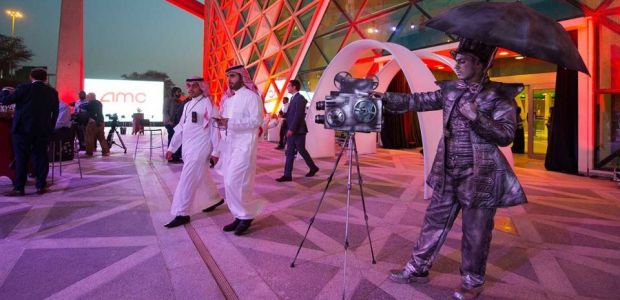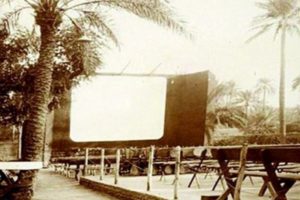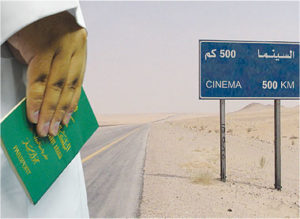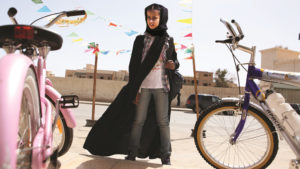It’s true that if you were born Saudi, it comes with many privileges. Unfortunately, it also means that many things that are taken for granted everywhere in the world were not part of our everyday life. “The distinctiveness of Saudi society” was the reason we were given when we asked why. One of these peculiar things that made us so distinctive is the lack of public cinemas, theatres, concerts, or any kind of public entertainment or performance (with a few rare exceptions). This was not always the case, however. I used to hear of a time when my uncle used to take his eldest daughter to watch movies at outdoor courtyard cinemas in our neighborhood. These places would not just screen the latest Egyptian dramas but also films from both Bollywood and even Hollywood. Such grounds were found all over Jeddah, and in several other cities as well. In Jeddah there was a modern cinema called Jamjoom which opened in 1962, and welcomed both families and individuals. There were also cinemas in sports clubs and hotels, which had double bill screenings over weekends.
By the end of the 1970’s however, the focus of Saudi society and Government shifted towards a more strict and conservative way of life, which was largely in response to certain regional and global changes. In addition to other changes, cinemas were banned, and TV censorship became restrictively austere. Welcome to the dawn of “the distinctiveness of Saudi society”. As someone who was born in 1977, this was my reality. I devoured TV (there was only Channel 1 that started in the mid 60s, and Channel 2 didn’t open till the mid-80’s), and then there was the joy of watching and discovering films and shows on VHS, which used to cost a fortune. In the summer, if the weather was warm and humid enough, we would sometimes receive Egyptian broadcasts which, compared to ours, were vastly both more diverse and more entertaining. By the 90’s, satellite dishes became more prominent, and many houses started putting them up. This was quickly followed by paid channels which filled the gap with offerings such as Showtime, Orbit, and ART. People started to get their fix of entertainment, but lifting the ban on cinemas was not up for debate. The irony was, even during this period of conservatism you could easily watch R-rated, often uncensored films in the privacy of your own home, but watching a PG-rated film in public was an impossibility.
As a college student in the 90’s, my friends and I would have our movie nights, where we would rent a VHS from a legitimate video store but also sometimes buy bootlegged CDs of films that were still playing in cinema around the world, many filmed secretly in cinemas in neighboring countries like Dubai (we deduced this from the Arabic subtitles). We used to envy our neighbours for simple joys that we were deprived of. The more I watched movies, the more I became a budding cinephile, and as soon as I graduated and had some disposable income, traveling to places like Dubai and Bahrain to watch films became a priority for me.
People living in the Eastern Province and Riyadh had it somehow easier. They always had the option to drive down to Bahrain. All it took was crossing the bridge on a weekend and they could view the latest movies. The population of this small Island Kingdom would get a considerable boost every weekend, holiday period, or during the summer season when Saudis come over in droves. There was even a documentary made in 2006 called Cinema 500 KM describing the road trip taken by a group of young men from Riyadh to Bahrain to watch a movie for the first time in a cinema. A popular sitcom also featured an episode where a group of friends took the same road trip to Bahrain, where en route shenanigans ensued, resulting in them arriving late and exhausted and leading eventually to them falling asleep as soon as the film started.
The status-quo remained this way, with the exception of places such as the Aramco compound in Eastern Province, and KAUST campus North of Jeddah, which have their own cinemas, but otherwise restricted to their residents, and off-limits to outsiders like myself. Normal folks had to travel far away and spend obscene amounts of money for simple entertainment (if they desired to do so), or if they were lucky, sometimes a public screening in summer would be held featuring animated films aimed primarily at children. At this point, online rumblings coupled with the local media commenting about the bizarreness of the situation was started to be heard. If a minority of conservatives didn’t want cinema, they were welcome to stay home. Why should they impose their view on everyone else? Not only were we deprived of entrainment, but our indigenous artists had no venue to showcase their films to the local audience unless it went directly to video, or was screened in Dubai or Bahrain. To be eligible for the Academy Awards submission, the Ministry of Information had to screen Haifaa Al-Mansour’s outstanding 2012 film Wadjda at the Chamber of Commerce auditorium to a select group of people. The film ended up not making the cut for the Oscars’, but it received many other accolades including a BAFTA nomination.
Challenging social norms, and changing the status quo is not exactly the easiest thing to do, especially in a country like Saudi Arabia. That was until the Crown Prince Mohammed Bin Salman (popularly known as MBS) started shaking things up. Commencing with his 2030 Vision announced in 2016 to “reduce Saudi Arabia’s dependence on oil, diversify its economy, and develop public service sectors”, things that were considered a part of the so-called “Saudi distinctiveness” became relics of the past and are being ditched like yesterday’s newspaper.
I was attending DIFF 2017 last December when news broke out that Saudi Arabia had lifted the ban on cinemas and that within 3 months the regulations shall be finalized and licenses would be issued. As soon as this news got out, you could hear the virtual “ka ching” sound in the heads of the CEO’s of every major international or regional cinema chain. Suddenly, AMC, VUE, VOX, Cinescape, etc. all wanted a piece of the pie. Many malls initiated expansions, and Google Maps starts showing locations for cinemas all over the major cities (though whether these are real or not remains to be seen).
In March 2018, the General Authority for Audiovisual Media (GACM), announced the regulations for granting a cinema license, with categories for permanent and seasonal cinemas. The licensees have to pay an annual fee per screen, plus 25% of the price of each ticket sold commercially. Even with such rules, the major international and regional chains were still clamoring for these licenses. American chain AMC, the biggest cinema operator in the world, secured the first license in late March, and they did not wait for their Multiplexes to be built (after all Rome wasn’t built in a day). Instead, they got hold of a beautiful, unused concert hall at the King Abdullah Financial District (KAFD) in Northern Riyadh, and declared that their cinema would be open for business on April 18, launching with the biggest blockbuster of 2018 so far, Black Panther. Social and conventional media went nuts. Everyone wanted to get a hold of this “golden ticket” but alas the premier was held exclusively for dignitaries and invited guests. The public had to wait a little longer. That wait didn’t last for more than a couple of days, as AMC declared that the public would get to buy their tickets online starting April 20, though this had a few caveats. Tickets went on sale only at midnight and only for that day’s show with regular tickets being sold for a whopping 75 SR each (more than double the price of similar tickets in Dubai or Bahrain). They were also offered (and in fact still are) only for families (single men had to wait for two weeks to be allowed in a separate screenings), and they started with only one screening a day (though this has now increased to three). The backlash on social media was savage, but despite this, tickets for the first two days that were offered were sold-out within a few minutes.
The region’s largest cinema chain VOX announced on April 19 that they had received their license to operates as well and would be open for business in a few weeks. They kept their promise and opened on April 30, with a 4 screen cinema in Riyadh Park Mall (not that far away from the AMC that opened at KAFD). Their cinema however also includes an IMAX screen, which will make for perfect viewing of Avengers: Infinity War and also the rest of summer tentpole releases. AMC though is going to feel the heat since VOX intends to offer tickets at cheaper prices. VOX also says they will invest 2 billion Saudi Riyals to open 600 screens all over the Kingdom, and many of these screens will be operational all over the country within the next 24 months, with another cinema opening at the end of 2018 in Riyadh, and Jeddah’s first in the beginning of 2019.
The wait has been long (and expensive), but I can say with confidence that I and many millions in the Kingdom look forward to having a screen open close to us soon, one that thankfully doesn’t require us to make airfare and hotel reservations.



